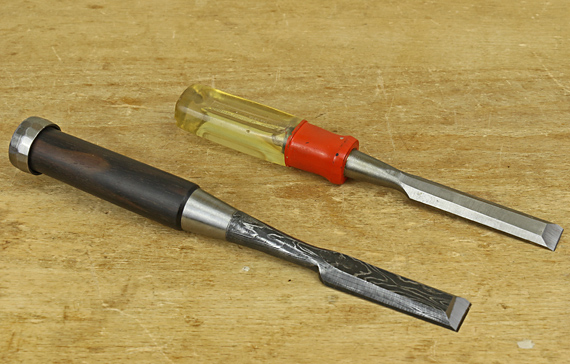
The most crucial impediment to learning woodworking skills that I have observed when advising woodworkers is the use of cheap, inappropriate, or poorly prepared tools. It is amazing how often student woodworkers – and this really includes all of us to varying degrees – are baffled by poor results from bad tools. Worse yet, the worker blames himself.
Well, it’s not your fault.
Sure, you can saw a tenon with a home center backsaw meant for rough carpentry – “just practicing,” you say – but not well and not reliably. What’s more, you will restrict learning the skill. You can also make that hardware-store chisel, shown above, fairly sharp and chop dovetails with it, but the edge will not last long, so you almost certainly will end up doing much of the work when it is dull or chipped. More subtly, you will not appreciate the final paring cuts that produce an excellent fit because you just cannot do them with control.
Do not blame yourself.
Though a skilled worker might get by with modest tools that are artfully modified, there are thresholds in the quality and fitness of a tool below which good work becomes nearly impossible.
Here is what to do, and it’s simple. Obtain tools that are appropriate to the task, and properly prepare, tune, and maintain them. Get a few very good tools – core tools – start woodworking, and then gradually get additional very good tools.
This will impose some limitations on the projects that you attempt, at least for a while, but that is better than attempting more ambitious projects with inadequate tools that lead to discouraging results, hampered learning, and worst of all, blaming yourself. Remember, an excellent general use tool will perform better at a wide range of tasks than multiple, more specific but mediocre tools.
If you do take the wrong road and slog on with lousy tools, then that will be your fault.


These are words few people will put to paper (screen?), but should be said.
I wince every time I see a conversation about the Aldi chisels and how you have to watch out for the “bad” batches with the questionable steel.
As much as possible, I try and use the highest quality tools I can get my hands on and tune them up as best I can.
I keep a cheap saw from Home Depot in the compartment in the back of my car for breaking down stock when it’s more than 10′ long and I need to get it home. That’s mostly because it’s short and fits in the compartment and I deal with reclaimed lumber and don’t like risking my good saws. Same with some lower quality chisels I use when I have to remove a broken nail and need to remove wood around it to give my nail puller space.
But everything else is the best I can get my hands on. I wish it was something new woodworkers could figure out sooner rather than later.
Thanks, Ethan. Yea, I think there are many people out there who maintain a fantasy that a really good woodworker ought to be able to make perfect dovetails with a sharpened screwdriver. I’m exaggerating, of course, but that sort of nonsense is discouraging to anyone who is learning new skills.
Rob
I know sometimes tools can be expensive and if you wanna learn something new you need new tools. I have a list of woodworking practices I wanna learn and perfect. I do not tackle anything new without having high quality tools to start with. I have tried to learn and practice new things with big box tools and just end up frustrated with the out come. I can across an article much like this one and took it heart. Start with quality tools apply a little patience and boom the out comes are much more appealing. With a little practice you will have great results. Great article and thanks for sharing
Thanks for the comment, Greg. Yes, sometimes tools, at least the bad ones, should bear the blame.
Rob